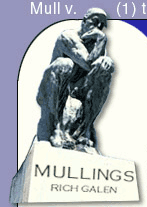|
|

|

Become a
Paid Mullings Subscriber!
(To join the FREE mailing list or to unsubscribe Click Here
Piercing the Shield
Rich Galen Monday July 11, 2005
Judith Miller, Pulitzer Prize winning reporter for the New York Times, is sitting in the federal lockup in Alexandria, Virginia in defense of a principle.
You have to respect her decision and applaud her courage, but this might not have been the best possible case on which to fall on the sword of justice.
First of all, it is not at all clear that any law has been violated. Second, it IS clear that Time Magazine's Matt Cooper got permission from his source to testify to the grand jury, and Robert Novak may have already disclosed the name or names.
However, a higher purpose might well be served if Ms. Miller's decision causes us to take a fresh look at shield laws - not that there should be more of them, but who should be shielded an in what circumstances.
The main problem I have with shield laws for reporters - as opposed to laws for doctors and lawyers - is this: Anyone can go to Kinko's and get themselves a badge which says: Reporter.
Voila! Shield.
SIDEBAR:
As a First Amendment issue, should Priests, Rabbis and Ministers have a shield protection against divulging discussions they have while performing their religious duties? In light of the Ten Commandments cases the Supreme Court just decided, and as a matter of separation of church and state, should religious customs trump criminal rules of procedure?
END SIDEBAR
On the other hand, in many jurisdictions who is deemed a reporter is pretty narrowly defined. According to The Reporters Committee for Freedom of the Press:
[M]any of the statutes define "journalist" in a way that only protects those who work full-time for a newspaper or broadcast station. Freelance writers, book authors, Internet journalists, and many others are left in the cold.
An on-line writer for Slate.com (which is owned by the Washington Post) might not be covered by a shield law, but a writer for the printed version of the newspaper would be.
Jayson Blair would have been shielded, not because he was a legitimate journalist in any known sense of the word, but because he carried a credential from the New York Times.
News readers on local and cable television - who often have no journalistic training beyond having really, really good hair - are covered by shield laws.
Make no mistake: There is a glimmer in the eye of many a national reporter hoping for the Valerie Plame case to develop, like a tropical depression in the South Atlantic, into a hurricane named George W. Bush's Second-Term-Scandal.
In their zeal to turn this case into Plame-gate, some reporters are in full projectile sweat mode. Jonathan Alter of Newsweek said on MSNBC the other day that without shield laws we wouldn't have known about Enron.
Beep! Sorry, Jonathon. Wrong answer. The Enron story was the result of two Wall Street Journal reporters on the West Coast who knew how to read publicly available financial documents.
At one point in his book about Enron, "Conspiracy of Fools," NY Times business reporter Kurt Eichenwald quoted an executive as complaining to chairman Ken Lay, "The Wall Street Journal knows more about what's going on at Enron than you do."
The lawyer representing Ms. Miller, interviewed on the local all-news radio station here the other day, stated in no uncertain terms that the principle which she was upholding was inviolate. He said that Miller does not consider that she has a choice in deciding which confidence to maintain and which to divulge.
The interviewer than asked what would happen if the disclosure of a covert officer led to that officer's assassination. Would Ms. Miller refuse to divulge the person who caused the death of another?
In that case, he said, she probably would divulge her source.
So, according to Miller's lawyer, a reporter - not a federal judge - gets to decide when a crime is serious enough to pierce the shield.
Another tough case to make.
On the Secret Decoder Ring page today: A link to the Reporters Committee for Freedom of the Press website; a Mullfoto from the Washington Nationals' game last week, and a Catchy Caption of the Day.
--END --
Copyright © 2005 Richard A. Galen
Current Issue |
Secret Decoder
Ring | Past
Issues | Email
Rich | Rich
Who?
Copyright �2002 Richard
A. Galen | Site design by Campaign
Solutions. | |
|







